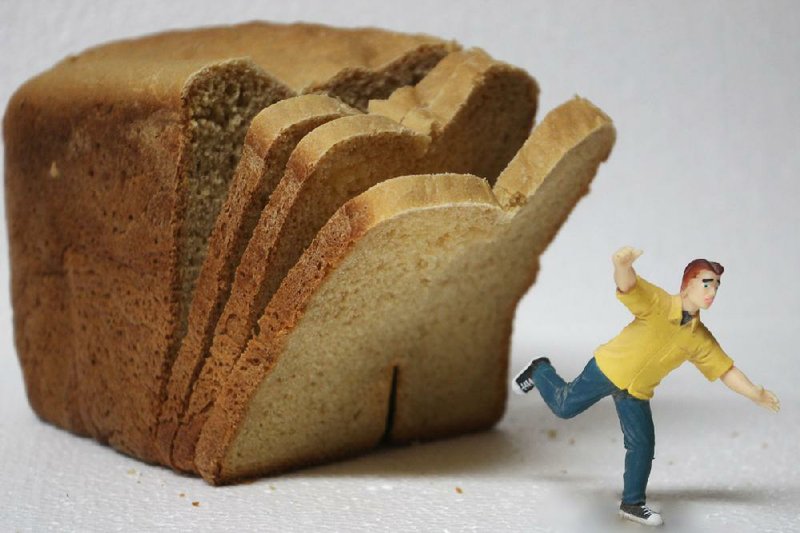The swelling ranks of Americans adopting gluten-free diets have given rise to another hot trend: people calling the whole thing a bunch of baloney.
And then requesting that the baloney be sandwiched between two pieces of white bread. Served with a cookie for dessert.
David Klimas has a friend who recently went gluten-free, a development that the 46-year-old real estate sales manager in Alexandria, Va., greets with a slow eye roll.
He thinks that the gluten-free thing is just a fad, promoted by food companies "as a way of making money."
"In the '50s, everyone had ulcers," he says. "Then, it was back problems. Now, it's gluten."
Gluten abstinence has grown dramatically over the
past several years. According to a survey by the NPD Group, a market-research firm, nearly a third of adults say that they're trying to either eliminate or cut back on gluten, a combination of proteins found in wheat and other grains. And this movement has spawned a burgeoning food industry valued at $4 billion and perhaps more than $10 billion -- and climbing.
Entire aisles at grocery stores are dedicated to the diet. Restaurant chains including Bob Evans, Hooters and Uno Pizzeria and Grill, offer gluten-free menus. Trade shows devoted to gluten-free products have popped up nationwide. Bars use menu icons to denote gluten-free beers.
All of which makes some people want to bang their heads against a flour mill.
"I don't get it," Klimas says of his friend's decision to cut gluten from his diet. "How can you all of a sudden be gluten-free? He's 45 .... Sometimes, I think it's just for him to be cool in front of the waiters."
About 1 percent of the American population suffers from celiac disease, according to the National Foundation for Celiac Awareness. This is a confounding affliction in which gluten consumption causes damage to the small intestine and interferes with the body's ability to absorb vitamins. Other people are sensitive to gluten and have negative reactions to consuming it but don't have celiac disease.
People who have celiac disease are often misdiagnosed before the cause of their health trouble -- which can include digestive problems, rashes, fatigue, headaches and joint pain -- is pinpointed. The only treatment for the disease is to give up gluten.
There has been a concerted effort to raise awareness of celiac disease, so that those living without a proper diagnosis can see an end to their suffering. But some people believe that the push has caused new gluten-free converts to believe that they have a disease they don't have.
CELEBRITIES WEIGH IN
The gluten-free backlash reached an apex in June, when comedian Jimmy Kimmel remarked on his late-night show that in Los Angeles, gluten was "comparable to Satanism," and sent a film crew to ask gluten-free dieters whether they knew what gluten was. (Most didn't.)
Talk-show host Chelsea Handler and a disgruntled Charlize Theron deconstructed the issue on-air after Handler sent gluten-free cupcakes to her friends, including Theron, for the winter holidays. "I just think that if you're going to send a gift, let it be enjoyable," fumed Theron, who said that the confection tasted "like cardboard."
PARADOX
Daniel Leffler, director of research at the Celiac Center at Beth Israel Deaconess Medical Center in Boston, said that between 2 million and 3 million Americans report maintaining a gluten-free diet, and about 10 percent of that group has celiac disease. The number of people diagnosed with the disease is rising -- doubling every 30 years, on pace with other autoimmune diseases such as Type 1 diabetes -- but the increase in that population is far outstripped by the explosive growth in people adopting the diet for other reasons, including weight loss.
This has led to what Leffler calls the gluten-free paradox: "Most people who are on the gluten-free diet don't have celiac disease, and most people who have celiac disease don't know that they have it and don't eat gluten-free."
Some nutritionists warn that dieters might be unnecessarily depriving themselves of healthy fiber found in whole grains -- and not compensating with fruits, vegetables and other sources of fiber.
Shira Kraft, an art gallery curator and author of Glutie Foodie, a blog that tracks her culinary adventures around town, was diagnosed with celiac disease almost four years ago. She says the gluten-free movement has been a double-edged sword for people who have the disease. On one hand, it's great to have more -- and much tastier -- products to choose from. But she also says that because so many people are staying gluten-free, her condition is sometimes taken less seriously.
"I certainly feel I have to defend myself," says Kraft, 31. "I'm embarrassed when I say that I'm allergic to gluten, because I feel like people are rolling their eyes. 'Just another one, part of the fad.'"
And although many restaurants are catering to gluten-free diners, some are putting limits on how far they'll go to accommodate them. Peter Pastan, owner of Etto, Obelisk and 2 Amys in Washington, draws the line at gluten-free pizza. Not that people don't ask for it. They do -- almost nightly.
"It's hard enough to make a good pizza," Pastan says. So he has given his servers a standard response to the gluten-free inquiries: "They say: 'You're absolutely right. I totally understand what you're saying, but my boss is crazy and there's nothing I can do about it.'"
ActiveStyle on 07/14/2014
